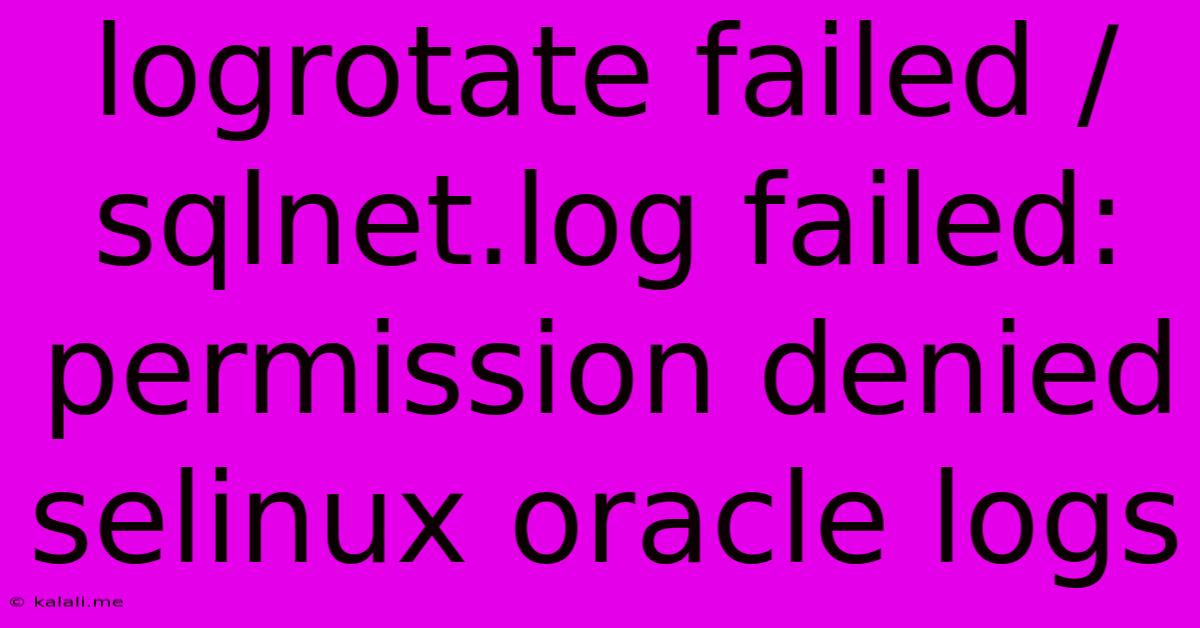Logrotate Failed /sqlnet.log Failed: Permission Denied Selinux Oracle Logs
Kalali
May 24, 2025 · 3 min read

Table of Contents
Logrotate Failed /sqlnet.log: Permission Denied - Troubleshooting SELinux and Oracle Logs
This article addresses the common issue of logrotate failing to rotate Oracle's /sqlnet.log file due to SELinux permission denials. We'll explore the problem, understand why it happens, and provide effective solutions to regain control over your log rotation process. This problem often surfaces when managing Oracle databases in a Linux environment with SELinux enabled. Understanding SELinux policies and their interaction with log management is crucial for successful troubleshooting.
Understanding the Problem:
The error message logrotate failed /sqlnet.log failed: permission denied indicates that the logrotate process, responsible for automated log file rotation, lacks the necessary permissions to access and manipulate the /sqlnet.log file. This is frequently caused by SELinux, a Linux kernel security module, enforcing security policies that restrict access. SELinux operates by default in enforcing mode, actively blocking actions deemed potentially unsafe. In this case, it's preventing logrotate from rotating the log.
Why This Happens:
The underlying cause is usually a conflict between the SELinux context of the /sqlnet.log file and the SELinux context of the logrotate process. Oracle often installs its log files with a specific SELinux context, and if logrotate doesn't have the appropriate permissions within that context, it will fail. Incorrectly configured SELinux rules or a mismatched context between the log file and the rotating process are the prime suspects.
Troubleshooting and Solutions:
Here's a breakdown of effective strategies to resolve this issue:
1. Check SELinux Status:
First, verify that SELinux is actually enabled and in enforcing mode:
getenforce
If the output is Enforcing, then SELinux is active and contributing to the problem. If it's Permissive, SELinux is logging potential issues but not enforcing them – you'll still see the error but need to adjust this mode to fix it.
2. Identify SELinux Context:
Determine the SELinux context of /sqlnet.log:
ls -Z /path/to/sqlnet.log
Replace /path/to/ with the actual directory where your /sqlnet.log resides. This command will show the context, usually something like system_u:object_r:oracle_log_t:s0. This context is crucial for the next steps.
3. Temporarily Disable SELinux (For Testing Only):
Caution: This is a temporary solution for testing purposes only. Disabling SELinux completely compromises your system's security.
setenforce 0
Attempt logrotate again. If it succeeds, you've confirmed SELinux is the problem. Remember to re-enable SELinux afterwards using setenforce 1.
4. Grant Permissions Using semanage: (Recommended)
This is the preferred and most secure method. We'll grant the logrotate process access to the Oracle log file's SELinux context. First, identify the user and group that logrotate runs as (often root). Then use semanage to add the necessary permissions:
semanage fcontext -a -t oracle_log_t "/path/to/sqlnet.log"
restorecon -Rv /path/to/sqlnet.log
Replace /path/to/sqlnet.log with the actual path. The -t oracle_log_t part assumes the context you found in step 2; adjust it if needed. restorecon ensures the file's context is correctly updated. You might need to reboot or run setenforce 1 before this takes full effect.
5. Adjust logrotate Configuration:
Ensure your /etc/logrotate.d/oracle (or similar) configuration file is correct. Check that the path to /sqlnet.log is accurate and that the file permissions allow logrotate to write to the rotated logs.
6. Reboot the System:
After making SELinux changes, rebooting the system often ensures the changes are fully applied.
Preventing Future Issues:
- Regular SELinux Audits: Periodically review your SELinux policies to identify and address potential conflicts.
- Precise Logrotate Configuration: Maintain accurate and detailed
logrotateconfigurations. - Oracle-Specific Considerations: Consult Oracle documentation for best practices on managing logs in a SELinux environment.
By following these steps, you can effectively troubleshoot and resolve the logrotate permission denied error related to Oracle's /sqlnet.log and maintain a robust log management system. Remember to prioritize security and always re-enable SELinux after testing in permissive mode.
Latest Posts
Latest Posts
-
How Many Apples In 3 Lb Bag
Jul 05, 2025
-
What Is Half A Quarter Of 400
Jul 05, 2025
-
How Do You Make A Vegetable Necklace
Jul 05, 2025
-
How Many 750ml Are In 1 75 Liters
Jul 05, 2025
-
How Many Grams Is In Half An Ounce
Jul 05, 2025
Related Post
Thank you for visiting our website which covers about Logrotate Failed /sqlnet.log Failed: Permission Denied Selinux Oracle Logs . We hope the information provided has been useful to you. Feel free to contact us if you have any questions or need further assistance. See you next time and don't miss to bookmark.